Inside the RAF bunker that helped win the Battle of Britain: Operation rooms where Churchill famously praised ‘the few’ who prevented Nazi invasion open their doors
-
•Bunker at RAF Uxbridge was base of No 11 Group who fought off two thirds of Nazi aircraft during three-month long battle
-
•Restored operation room and accompanying museum are open to the public on weekends until end of month
-
•RAF base inspired one of Winston Churchill's most famous wartime speeches
PUBLISHED: 10:12, 24 August 2013 | UPDATED: 10:12, 24 August 2013
It's the scene of some of the most crucial developments in British history, where RAF commanders masterminded the defeat of the Nazis during the Battle of Britain.
The bunker was home to the division of Fighter Command responsible for striking down the enemy between July and September, 1940, after Hitler launched his campaign for superiority over the British air forces.
Known as the Battle of Britain bunker, the base in Uxbridge, west London, is now open to the public, offering visitors a rare glimpse into the Britain's wartime past with its restored operations room and accompanying museum.
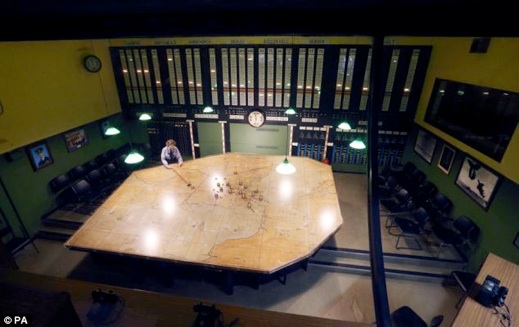
The flight operations room at RAF Uxbridge fought off more than two thirds of enemy aircraft during the Battle of Britain in 1940
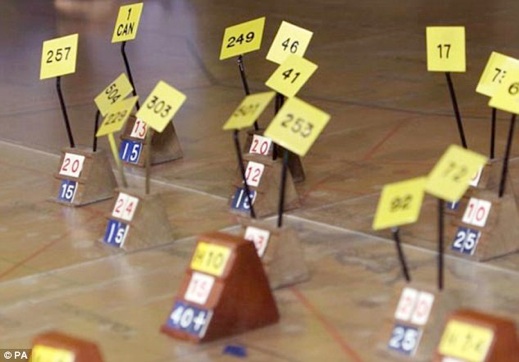
The operations room has been restored to depict what life was like for members of the No 11 Group who worked from the bunker in west London
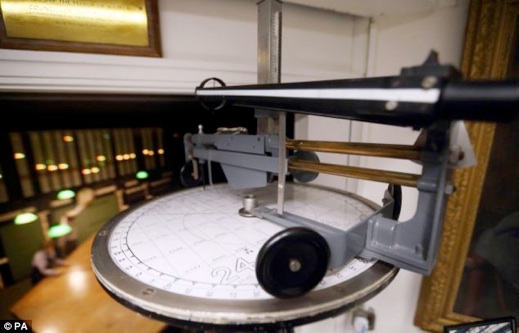
Equipment in the Flight Operations room which has been restored to offer visitors a rare glimpse into how British forces defeated the Nazis
The commanders of No 11 Group, who destroyed more than two thirds of the 1,733 Nazi aircraft brought down by British forced during the battle planned their strategy from within the bunker.
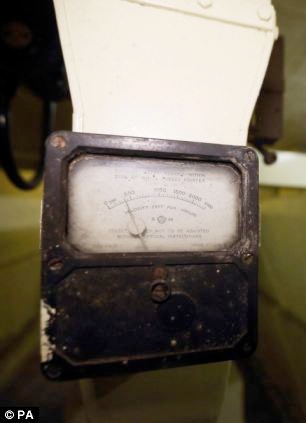
The operations room has been fully restored to offer visitors an insight into British wartime history while original features like the ventilation system still work
The base, which saw most action because of its location in the south east of England, was the inspiration for Winston Churchill's famous wartime speech which began: 'Never in the field of human conflict was so much owed, by so many, to so few'.
The Battle of Britain began after German forces successfully invaded France in May 1940, and was Hitler's attempt to gain superiority over the RAF. It was the first major campaign to be fought entirely by air forces and was the largest and most sustained series of aerial bombings at the time.
Germany's failure to destroy British air defences is considered its first major defeat, and a crucial turning point in WWII.
The battle was fought in four stages, the first being a series of running fights over the English channel followed by a string of raids on RAF bases which was given the name 'Adlerangriff' or 'Eagle Attack'.
On August 24 the Luftwaffe targeted British airfields but the RAF prevailed. After German Air Forces bombed various British towns and cities, Hitler conceded inferiority to British air defences and postponed Operation Sealion, his planned invasion.
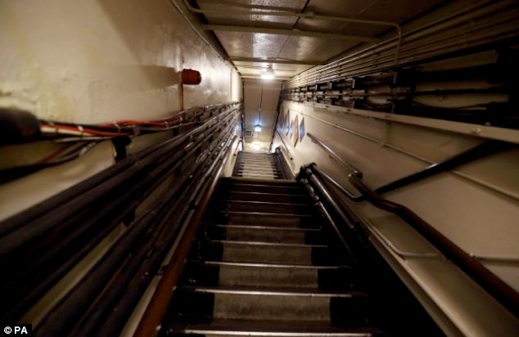
The bunker was the centre for No 11 Group who fought off more than two-thirds of the Luftwaffe during the battle which spanned almost three months
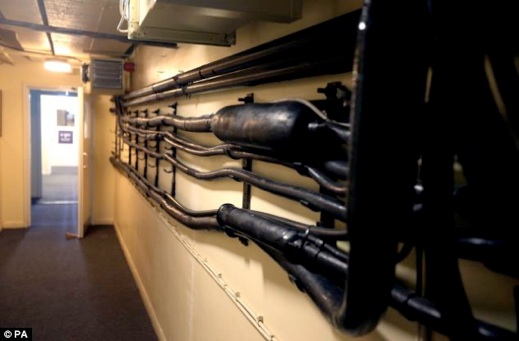
Steel pipes and wires run through the restored bunker in Uxbridge which will reopen next year after closing at the end of the month
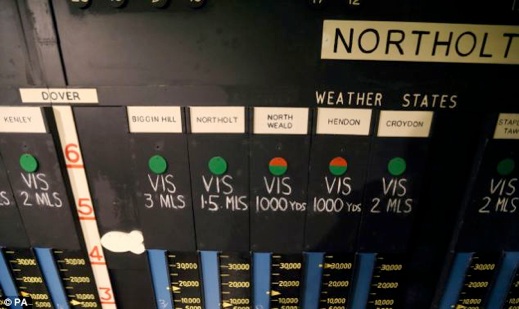
A display in the Flight Operations Room shows the weather states at various RAF bases
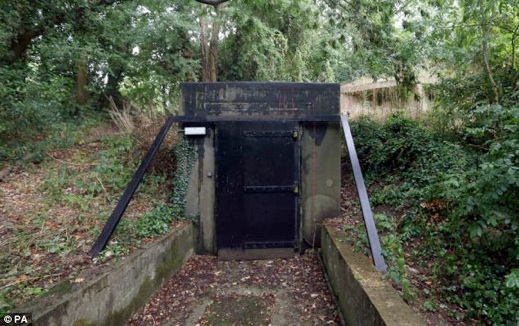
The back entrance to the bunker from which No 11 Group of Fighter Command operated during the crucial months in British history
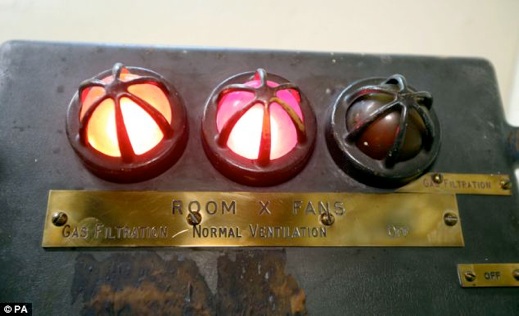
The original ventilation system still works in the bunker which will be open to the public on weekends until the end of August
Though he announced his plan in 'Spring 1941', it never took place.
The restored operations room and museum allows visitors an insight into one of the most crucial stages in British history.
Curator Daniel Stirland said: 'We have had about 100 people on average each weekend day, to add to those who visit by appointment during the week.
'They come from all over the UK and abroad. The trial has gone very well and we are almost certainly going to do it again next year as well.'
'NEVER WAS SO MUCH OWED BY SO MANY TO SO FEW': WINSTON CHURCHILL'S FAMOUS WARTIME WORDS AFTER HIS BUNKER VISIT
Following a visit to the RAF Uxbridge bunker on August 16, 1940, Winston Churchill uttered the famous words: 'Never was so much owed, by so many, to so few'. Days later they set the tone for one of his most distinctive wartime speeches at the House of Commons.
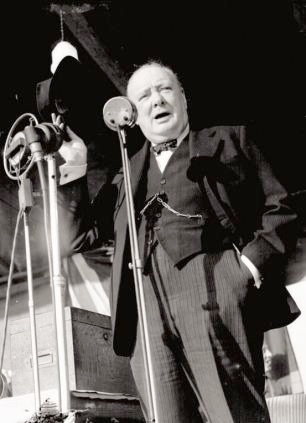
Winston Churchill delivered the famous speech on August 20, 1940 after a visit to RAF Uxbridge bunker
'The whole Island bristles against invaders, from the sea or from the air. …the stronger our Army at home, the larger must the invading expedition be, and the larger the invading expedition, the less difficult will be the task of the Navy in detecting its assembly and in intercepting and destroying it in passage; and the greater also would be the difficulty of feeding and supplying the invaders if ever they landed'
'Why do I say all this? Not, assuredly, to boast; not, assuredly, to give the slightest countenance to complacency. The dangers we face are still enormous, but so are our advantages and resources. I recount them because the people have a right to know that there are solid grounds for the confidence which we feel, and that we have good reason to believe ourselves capable, as I said in a very dark hour two months ago, of continuing the war "if necessary alone, if necessary for years."'
'The gratitude of every home in our Island, in our Empire, and indeed throughout the world, except in the abodes of the guilty, goes out to the British airmen who, undaunted by odds, unwearied in their constant challenge and mortal danger, are turning the tide of the World War by their prowess and by their devotion.
'Never in the field of human conflict was so much owed by so many to so few. All hearts go out to the fighter pilots, whose brilliant actions we see with our own eyes day after day, but we must never forget that all the time, night after night, month after month, our bomber squadrons travel far into Germany, find their targets in the darkness by the highest navigational skill, aim their attacks, often under the heaviest fire, often with serious loss,with deliberate, careful discrimination, and inflict shattering blows upon the whole of the technical and war-making structure of the Nazi power.'
Published by Associated Newspapers Ltd
Part of the Daily Mail, The Mail on Sunday & Metro Media Group